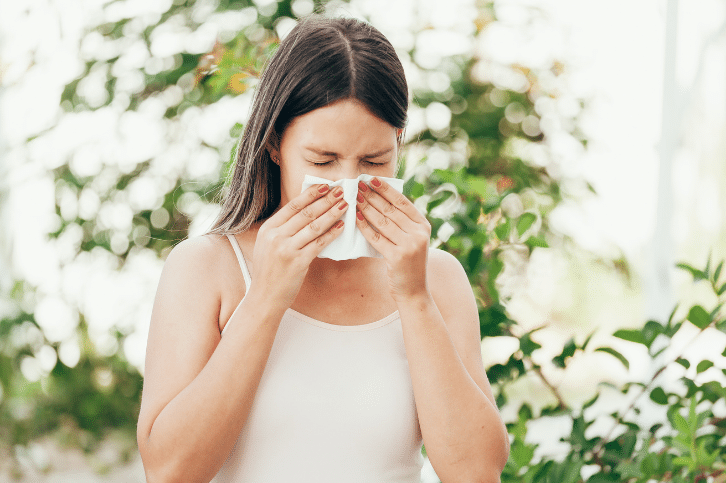Sneezing, a runny nose and watery eyes…yes, springtime in Connecticut is almost here. While allergies begin during the spring months, typically starting in March, they can last through the fall as late as October. While seasonal allergies can feel like a nuisance, it is important to seek treatment for them to determine what is causing them and how you can best move forward without any disruptions to your routine.
How Common Are Seasonal Allergies in Connecticut?
Over 50 million people in the U.S. have experienced allergy symptoms, making it a leading chronic illness. Allergies can develop at all ages with 30% of U.S. adults experiencing seasonal allergies and 40% of children. The most common type of allergy triggers include tree, wood and grass pollen, mold spores, dust mites, and dander.
Unfortunately, Connecticut has one of the most challenged cities in the country for allergy sufferers. Hartford, Connecticut specifically is in the top five cities for worst seasonal allergies due to high pollen levels, leading to raised levels of allergies in the population. The National Pollen Map indicates how high allergen levels are daily in the environment in Connecticut and the specific irritants in the air such as juniper or grass. If you notice that there is an especially high likelihood of allergens present, it may be best to stay indoors and use indoor air conditioning versus opening a window.
Many allergens are high during spring due to tree pollen emerging in March and April and grass pollens appearing from May through July. Common trees causing problems in spring in Connecticut include Elder, Red Mulberry and Pussy Willow. Ragweed is also common in parts of Connecticut and can cause allergies.
What Is the Difference Between a Common Cold and an Allergy?
The main difference with a cold is a virus causes it, but an allergy is the body’s immune response to an allergen such as pollen. A cold usually lasts for three to 10 days and is treated with rest, decongestants and cold remedies. Allergies are treated by avoiding the substance, antihistamines and nasal steroid sprays. The symptoms can last for several weeks and can be seasonal, especially in spring.
What Are the Symptoms of Cold and Allergies?
One of the easiest ways to start working out what could be wrong when you begin sneezing is to look at the signs. Some symptoms are very similar in both colds and allergies. A runny nose, feeling congested and sneezing are typical in both conditions. Sometimes you get a sore throat or cough with a cold, but this is rare with allergies. General aches and pains are common in colds and sometimes a fever, but not with an allergy.
Symptoms that are more suggestive of an allergy (as they are rare or do not occur in colds) include itching and particularly itchy eyes. In addition, some people develop a rash, depending on the irritant.
Allergies can be seasonal or perennial. Seasonal allergies tend to occur with irritants like pollens in spring. Perennial allergies occur all year round and are likely due to mold, dust and other irritants.
Why Getting Help for Allergies Is Important
Common colds are easy to treat and usually resolve in a few days. Allergies continue for weeks. There are several reasons why getting help from an expert is important if you think you have an allergy.
Identifying the allergen. Understanding the specific allergen causing your symptoms is essential. First, you can remove it in some cases, such as deep cleaning a home to eradicate house mites. You can also avoid exposure to pollens and stay away from allergens when the pollen count is high, for example.
Getting the correct treatment. Once you know you have an allergy, you can use antihistamines or nasal steroid sprays to reduce inflammation caused by an allergic reaction. Getting the correct treatment will help you manage your symptoms.
Lifestyle issues. Suppose you have an allergy to seasonal pollens. In that case, it can disrupt your work, especially if you are working in hospitality, driving or the health sector where constant sneezing and itching are hard to manage. In addition, it coincides with college and school exams and can disrupt studying.
Links to other conditions. If you also have asthma, allergies can make exacerbations worse. Allergic asthma is the most common form of the disease and can be worsened by allergens such as pollen and dust mites. It is therefore vital to have a management plan.
How To Get Help for Allergies in Connecticut
One of the best ways to get help for allergies is from a specialist. They will review your history and perform tests to determine the allergen and the best course of treatment. Once you have a treatment plan, you will be able to go about your life with significantly reduced symptoms and feel more comfortable. It is also important to have a dust-free home, eat healthily to boost your immune system and avoid smoking. Research shows that allergies are more common in smokers, especially those who also have asthma.
Looking For a Primary Care Doctor in Connecticut?
PACT Primary Care is Accepting New Patients!
Locations throughout Connecticut in Guilford, Hamden, Madison, Milford, New Haven, Orange, West Haven and Wallingford.
To schedule an appointment, request an appointment online here or call a local center near you.








